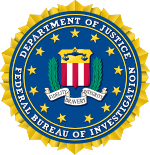Director of the FBI
| Director of the Federal Bureau of Investigation |
|
|---|---|

Seal of the Federal Bureau of Investigation
|
|

Flag of the Federal Bureau of Investigation
|
|
|
U.S. Department of Justice Federal Bureau of Investigation |
|
| Reports to |
Attorney General Director of National Intelligence |
| Seat | J. Edgar Hoover Building, District of Columbia, U.S. |
| Appointer | The President with Senate advice and consent |
| Term length | 10 years |
| Inaugural holder |
Stanley Finch (BOI) J. Edgar Hoover (FBI) |
| Formation | 1908 (as Chief of the BOI) |
| Deputy | Deputy Director |
| Website | www.fbi.gov |
The Director of the Federal Bureau of Investigation is the head of the FBI, the United States' primary federal law enforcement agency, and is responsible for its day-to-day operations. The FBI Director is appointed for a single 10-year term by the President and confirmed by the Senate. The FBI is an agency of the Department of Justice. Since the 1920s, the FBI has been supervised by the Department of Justice and the FBI Director has answered to the Attorney General. The Director briefed the President on any issues that arose from within the FBI until the Intelligence Reform and Terrorism Prevention Act of 2004 was enacted following the September 11 attacks. Since then, the Director reports to the Director of National Intelligence, who in turn reports to the President.
The current Director is Christopher A. Wray, who assumed the role on August 2, 2017 after being confirmed by the U.S. Senate, taking over from acting Director Andrew McCabe after the dismissal of FBI Director James Comey by President Donald Trump. On June 7, 2017, President Trump indicated his intention to nominate Christopher A. Wray for the vacant FBI Director office.
The FBI Director is appointed by the President and, since 1972, subject to confirmation by the Senate.J. Edgar Hoover, appointed by President Calvin Coolidge to the predecessor office of Director of the Bureau of Investigation in 1924, was by far the longest-serving Director, holding the position from its establishment under the current title in 1935 until his death in 1972. In 1976, in response to Hoover's lengthy tenure and during the Watergate era, by an amendment to the 1968 Omnibus Crime Control Act,Congress limited the term of future FBI directors to ten years, "an unusually long tenure that Congress established to insulate the director from political pressure." This rule was waived by the Senate for Robert Mueller on July 27, 2011 due to serious security concerns at that time. Since 1976, Directors serve a ten-year term unless they resign, die, or are removed, but in practice, since Hoover, none have served a full ten years, except Mueller who served twelve years with the leave of Congress.
...
Wikipedia

